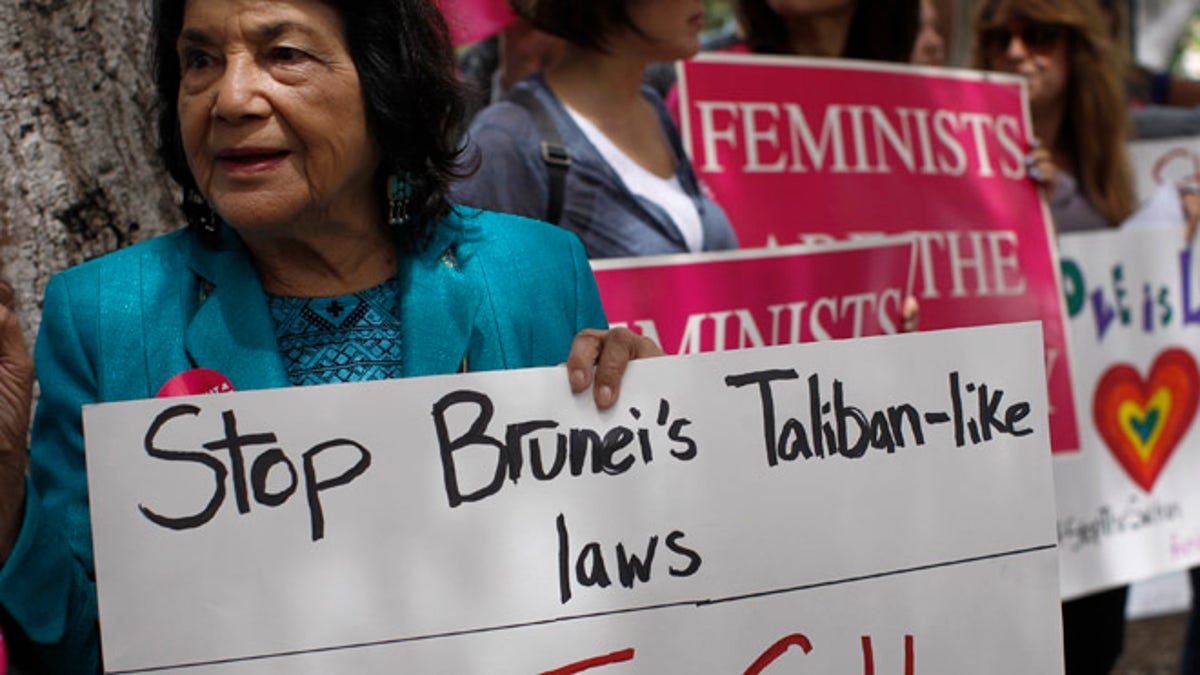
United Farm Workers co-founder Dolores Huerta during a rally on May 5, 2014 in Beverly Hills, California. (David McNew)
When I was in high school, I became very active in community organizing. As a young Chicana in the 90’s in Albuquerque, New Mexico, I was constantly speaking up and speaking out, much to the dismay of many teachers and classmates.
I was called pushy, a reverse racist and constantly mocked for my opinions. As a young woman with few people in the history books to look up to, United Farm Workers co-founder Dolores Huerta was my hero.
In the last few years, I have found myself reconciling my nostalgia for Dolores Huerta the icon and my disagreement with Dolores Huerta the political spokesperson.
Twenty years later, I am in a position to help other women reach their potential as leaders. Dolores Huerta’s example serves as a guide, and regardless of our differing opinions, one thing remains true – her example taught me that I don’t ever have to sit on the sidelines.
While attending the Nevada caucus recently, Huerta tweeted that when she offered to translate at a caucus event in Las Vegas, she was met with Bernie Sanders supporters chanting: “English only! English only!”
The inevitable Twitter storm followed, with people demanding that Sanders reprimand his supporters for heckling a Brown woman – an icon at that. When reports refuted the claim of chants of “English only,” there was an immediate backlash against Dolores Huerta, as well as actress America Ferrara who also claimed the Sanders supporters were chanting. (It’s unclear whether or not she was there).
Later reports showed that neither side’s accounts are 100 percent accurate.
Dolores Huerta was trying to ensure that Spanish-speakers would be included in the caucus, but she should not have been put in the position to offer to translate, especially because she is openly a supporter of Democratic presidential hopeful Hillary Clinton.
In a state like Nevada, that has a high population of Spanish-speaking voters, the state party should have ensured there would be translation services available. The chair of the caucus made the mistake of asking the audience for a translator, then saying, “We’re going forward in English only,” when a consensus could not be reached.
My first instinct was to bristle at the mention of Huerta’s name in a less than flattering light, but I am also reminded that blind hero worship does not serve our movement toward social justice.
Huerta has the right to support whomever she chooses, as do I. She also has the right to use her influence to be a spokesperson for whomever she chooses, even when facing criticism for doing so. A friend reminded me that Dolores Huerta did not earn her power by being afraid or complacent.
Regardless of her support for Clinton, she did not deserve to be disrespected by the audience. Disagreement is one thing; disrespectful behavior is unacceptable.
This is not the first incident where I have disagreed with Huerta’s political actions. Leading up to the 2014 midterm Congressional elections, Huerta pleaded with Latinos to vote Democrat in order to hold on to control of the Senate.
Responding to the growing criticism of Democrats’ inaction on immigration reform, particularly President Barack Obama’s delay of expanding Deferred Action for Childhood Arrivals, Huerta advised Latinos and Immigrant communities to be patient.
“We’ve been waiting – we are a community that can wait,” she said. “And we have to have faith in our president, because the Republicans have shown their hand. We know what they want to do.”
The idea of holding off on immigration reform did not work, as the Republicans took both the House and the Senate, and even led many Latinos to call for a boycott of the vote.
Many people, myself included, felt disappointed by Huerta and what seemed like an endorsement of establishment politics rather than encouraging people to fight. It’s also worth noting that Huerta, like myself, was born a citizen of the United States. Although she is Chicana, she is not in a position to tell Immigrants to be patient for the sake of winning elections.
The icon I admire – a bossy Chicana who embraced her nickname, Dragonlady – is also a living person who has opinions I disagree with. None of that detracts from her work, her place in history or her legacy.
Huerta did not sit quietly on the sidelines during the United Farm Workers movement in the 1960’s. As a young woman, I needed her example to grow comfortably into my own skin and feel OK with being a bossy, outspoken Chicana.
Twenty years later, I am in a position to help other women reach their potential as leaders. Dolores Huerta’s example serves as a guide, and regardless of our differing opinions, one thing remains true – her example taught me that I don’t ever have to sit on the sidelines.
At a celebration of Cesar Chavez’s life in 2013, I found myself dancing a cumbia with none other than Dolores Huerta. I had a big smile on my face as I danced with someone who taught my 17-year-old self that there was nothing wrong with being outspoken and standing in my own power.
This legacy has inspired countless women worldwide, and rightly so. Huerta’s legacy should also be one that mandates our communities to hold each other accountable, even our icons.
